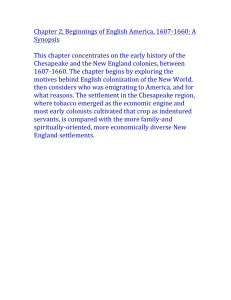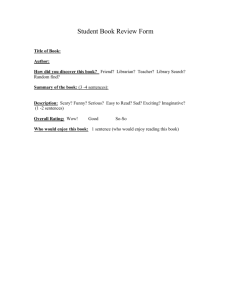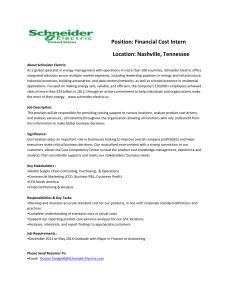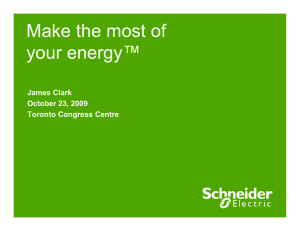APUSH (2013) - McAuley High School
advertisement
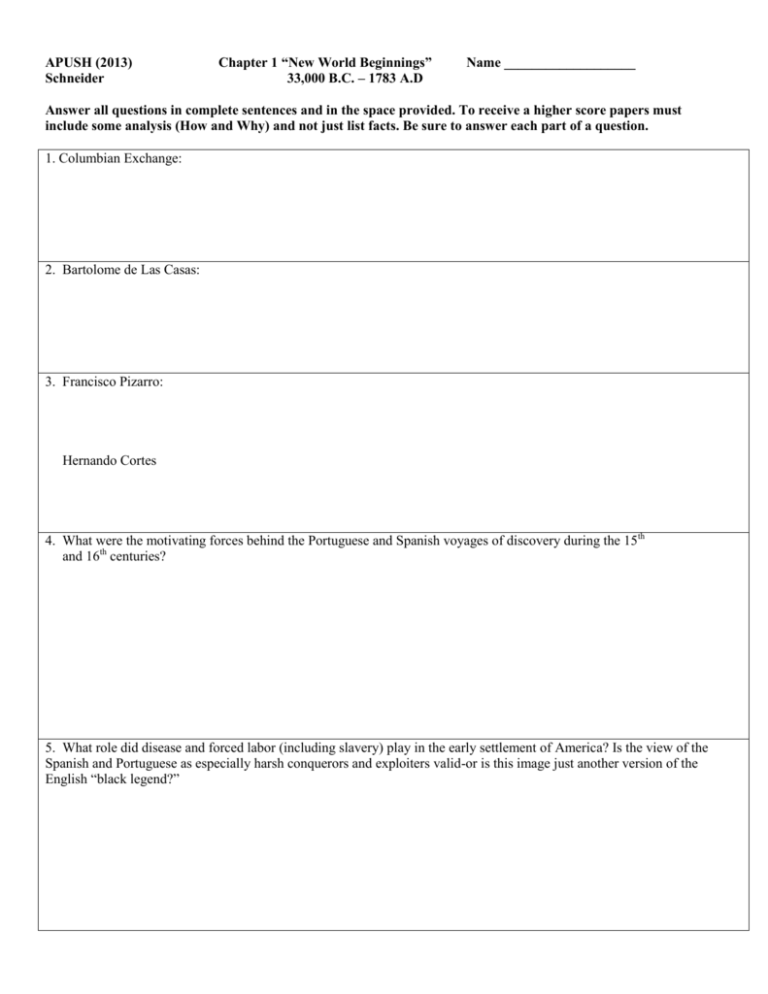
APUSH (2013) Schneider Chapter 1 “New World Beginnings” 33,000 B.C. – 1783 A.D Name ___________________ Answer all questions in complete sentences and in the space provided. To receive a higher score papers must include some analysis (How and Why) and not just list facts. Be sure to answer each part of a question. 1. Columbian Exchange: 2. Bartolome de Las Casas: 3. Francisco Pizarro: Hernando Cortes 4. What were the motivating forces behind the Portuguese and Spanish voyages of discovery during the 15th and 16th centuries? 5. What role did disease and forced labor (including slavery) play in the early settlement of America? Is the view of the Spanish and Portuguese as especially harsh conquerors and exploiters valid-or is this image just another version of the English “black legend?” AP United States History (2012) Schneider Ch. 2 “The Planting of English America” 1500 – 1733 Answer all questions in complete sentences and in the space provided. To receive a higher score papers must include some analysis (How and Why) and not just list facts. Be sure to answer each part of a question. 1. Spanish Armada, 1588 2. “Great Migration” 1630-1640 3. John Smith 1580-1631 4. John Rolfe 1585-1622 5. Pocahontas 1595-1617 6. Tobacco 7. Sugar 8. Roanoke 9. Joint-Stock Company 10. charter 11. Indentured Servant 12. squatter 13. Analyze what England and the English settlers really want from colonization? National glory? Wealth? Adventure? A solution to social tensions? New sources of goods and trade? Did the English get what they wanted? 14. Analyze how the sugar economy of the West Indies different from the tobacco economy of the Chesapeake? AP United States History (2012) Schneider Ch. 3 “Settling the Northern Colonies” 1619-1700 Answer all questions in complete sentences and in the space provided. To receive a higher score papers must include some analysis (How and Why) and not just list facts. Be sure to answer each part of a question. 1. Predestination 2. Pilgrims or “Separatists” 3. Puritans or “Congregationists” 4. Mayflower Compact, 1620 5. Anne Hutchinson 6. John Winthrop “City Upon a Hill” 7. Glorious Revolution, 1688 8. Great Puritan Migration, 1630 9. King Philip’s War 1675-1676 10. Edmund Andros 11. William Bradford 12. Mistress Anne Pollard 1621-1725 13. William Penn “Holy Experiment” 14. Peter Stuyvesant (1602-1682) AP United States History (2012) Schneider Ch. 4 “American Life in the 17th Century” 1607-1692 Answer all questions in complete sentences and in the space provided. To receive a higher score papers must include some analysis (How and Why) and not just list facts. Be sure to answer each part of a question. 1. Tobacco 2. Indentured Servant 3. Nathaniel Bacon 4. Half-Way Covenant 5. Massachusetts School Law of 1647 6. Headright System 7. Middle Passage 8. FFV’s 9. Analyze how the Salem Witch Trials reflect the tensions and changes in 17th century New England life and thought? 10. Analyze the impact of Bacon’s Rebellion 1676 on indentured servants and the growth of African slavery in Virginia. 12. Compare the economic, social, and religious life, in New England, Middle and Chesapeake regions circa 1750. Use Chapter 5 as well for this question. Economy New England Massachusetts, R.I. Conn. and New Hampshire Middle New York, New Jersey, Delaware, Pennsylvania Chesapeake Maryland, Virginia Carolinas, Georgia Society Religious Life AP United States History (2012) Schneider Ch. 5 “Colonial Society on the Eve of Revolution” 1700 - 1775 Answer all questions in complete sentences and in the space provided. To receive a higher score papers must include some analysis (How and Why) and not just list facts. Be sure to answer each part of a question. 1. Paxton Boys and Regulators 2. Jonathan Edwards 3. The Great Awakening 1730s – 1740s 4. Scotch-Irish 5. Michel-Guillaume Jean de Crevecoeur 1735-1813 6. Poor Richard’s Almanack 7. Peter Zenger 1734-1735 8. Analyze the causes and the consequences of the First Great Awakening? 9. Analyze the features of colonial politics that contributed to the development of popular democracy and what kept political life from being more truly democratic?

